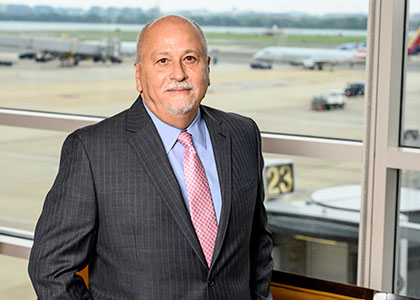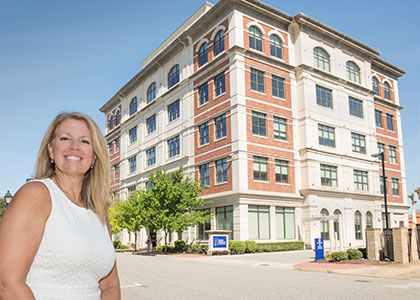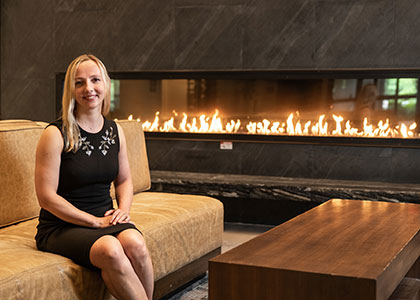Preparing for the worst
Amid pandemic, CFOs positioned businesses for recovery
Preparing for the worst
Amid pandemic, CFOs positioned businesses for recovery
Read about the 2021 Virginia CFO Award winners.
John Brocato’s coveted tickets to the Atlantic Coast Conference men’s basketball tournament suddenly became void in March 2020 after the ACC canceled the tournament as the COVID-19 pandemic began turning the world on its head.
And as the chief financial officer of a small building supply company with offices in Charlottesville and Fluvanna County, Brocato had to abruptly stop thinking about basketball and begin thinking how his company, Better Living Inc., founded in 1893, was going to continue operating.
Taking actions such as keeping employees on the payroll was critical not only during the pandemic but also to lay the foundation for a better recovery after the pandemic was under control.
CFOs in various sectors across Virginia — from banking to transportation to higher education — faced similar challenges, although circumstances differed widely. And in a trend accelerated by the pandemic, CFOs saw their roles expand far beyond spreadsheets and balancing books into administrative matters.
Some CFOs were responsible for shifting their workforce to remote work, creating a new paradigm that had implications beyond the pandemic. But for others, such as Brocato, keeping workers safe at an in-person job site was essential to staying in business.
Brocato sent out his first pandemic-related memo on March 25, 2020, outlining how Better Living would be responding to COVID-19.
A few days earlier, company officials learned that Better Living had been designated an essential business because of its affiliation with the construction industry and that industry’s contribution to the nation’s economic security. Only two of the company’s 90-plus employees had the ability to work remotely. All others had to be on site.
“Our first goal was to make sure our employees were taken care of emotionally, physically and financially. Kids were home from school and parents didn’t know what to do. People were stressed, and we wanted to take the work stress off,” Brocato says.
Social distancing
Better Living operates two locations. One is a three-story building in Charlottesville that houses administrative offices, a showroom and cabinetry design studio for bathrooms and kitchens, and a building supply department and hardware store. The company’s other site is in Fluvanna County, where its mill shop turns out everything from custom wooden stairs to remanufactured doors.
“We supply contractors and builders, and we do everything except brick and block from the ground up,” Brocato says.
Initially, some Better Living employees were resistant to wearing protective masks and gloves, so administrators wanted to set an example. “My wife made us cloth masks. She probably made around two dozen,” recalls Brocato.
He was able to get a buy-in on the personal protective equipment from managers and they sold the importance of the precautionary steps to workers. “In a short time, everybody was following the rules,” he says.
On the bottom floor of the company’s Charlottesville location, Better Living opened the windows and positioned sales personnel inside to assist customers. Gates were erected outside the windows to maintain a 6-foot social distancing gap between. Later, tents and structures were erected for customers.
Inside the building, office cubicles were moved 10 feet apart, and workers were cautioned not to interact with anyone in another department. “We used the elevator to move paperwork and supplies from floor to floor, wiped everything down with sanitary wipes, including the paperwork as much as we could do without ruining it,” Brocato says.
Overall, he says, company officials preferred an overabundance of caution to an outbreak that could force a shutdown.
In the lumberyard, customers were required to park their trucks, which they could pick up after the vehicles were loaded.
Some parts of Better Living’s business slowed down, principally the mill shop, but Brocato says he and other company officials worked hard to prevent any layoffs.
Meanwhile, “the really surprising thing for us is that the building supply industry just went crazy. People staying at home started working on decks and basements.”
He adds, “I think this industry is going to have a very strong summer, and from a numbers standpoint construction will still be strong through early fall.”
The downside of the business uptick was that the initial lead time for ordering some items increased from three weeks to three months due to supply chain issues and increased demand.
Also, lumber prices soared as remodelers, contractors and homeowners rushed in. In some instances, the cost of lumber tripled. “Lumber is a commodity, like oil,” Brocato says, and major lumber mills determine how much lumber they produce and set prices accordingly.
Brocato has been a CPA for 13 years and had a background in manufacturing and distribution before he joined Better Living.
The pandemic, he says, offered new lessons for the company in how to be creative, more efficient and push through adversity. As a result, Brocato says, Better Living is able to respond more quickly and more reliably as the recovery begins.

Turbulent year for airports
2020 was the most challenging year in the history of the airport industry, with passenger traffic dropping nearly 90% during the height of the pandemic shutdowns, according to the Metropolitan Washington Airports Authority, which oversees Washington Dulles International and Reagan National airports, in addition to the Dulles Toll Road.
Andrew Rountree, the authority’s CFO, says he and other airport officials suspected the pandemic was going to be lengthy and would take a negative financial toll — but like every other business, they didn’t know to what extent.
Rountree lives by a simple rule: “The best way to anticipate a downturn is to prepare for it.” And with that in mind, he says, “we must have run hundreds of financial scenarios to determine how we should be managing this both financially and operationally.”
Cutting expenditures was the first step. “The early target was 10% under budget for the pandemic year 2020. We ended up coming out 20% under budget, managing things carefully,” Rountree says.
Liquidity was key to keeping the authority running, and it’s also important for a robust recovery, the CFO says. “Our operating liquidity was good,” Rountree adds. “We had over a thousand operating days of cash on hand.”
In addition to that operating reserve, the authority also had set aside funds for ongoing construction projects, and it identified a combined $200 million in projects that could be deferred.
A successful $900 million bond sale in early June also positioned the authority for a strong recovery.
Hundreds of millions of dollars in grants obtained by the airports authority, including $229 million from the CARES Act, part of a $2.2 trillion federal economic stimulus bill, also helped the authority make it through the difficult period.
Rountree is hopeful that the Washington airports will be operating at pre-pandemic levels by the end of 2022.
“I’m very optimistic about the future,” he says, but he’s also preparing for whatever comes, good or bad.
It’s all part of his mantra to be prepared.

Drive-thru loans
At Old Point Bank, headquartered in Hampton, CFO Elizabeth Beale says the move to remote work during the pandemic enabled the bank to seek talent farther afield and to better prepare for a meaningful recovery.
“We’ve hired in Charlotte, in Richmond, in Roanoke, in Christiansburg. We know now how to do this. It really opens a door from a talent perspective,” Beale says. “My opinion is that the virtual workforce is going to be more useful for us going forward.”
Beale adds that Old Point also was quickly able to move from a nearly total in-office workforce to a 70% virtual workforce.
The pandemic also saw the bank innovate new ways for interacting with customers. “We were closing loans in the drive-thru,” Beale recalls.
More customers also engaged in mobile banking — there was a double-digit increase — and the bank created an online appointments system for booking customer meetings that could be held either virtually or in person.
“What we learned during the pandemic was that we could quickly implement significant change,” Beale says.
As the recovery unfolds, Old Point has benefited from a surge of assets — an 18% jump between the first quarter of 2020 and the first quarter of 2021, to $192.4 million.

“The industry did not anticipate that people who continued to work saved more,” Beale says, explaining the rapid rise in assets despite higher unemployment numbers during the pandemic.
“We’ve grown a lot,” Beale says, “but we’re challenged to earn as much on that growth as we possibly can.”
Another issue is that although Old Point made more than 1,400 loans through the federal Paycheck Protection Program to aid small businesses, the low 1% interest rate on PPP loans has the banking industry concerned about the loans’ ultimate return.
“Another challenge,” Beale says.
Sweat equity
CFO Aleksandra “Ola” Harcum and other top executives at Commonwealth Commercial Partners, a Richmond-based commercial real estate firm, took a 10% pay cut as the pandemic hit their industry.
Because many commercial properties began suffering revenue losses, Harcum says, her company worked with lenders to obtain commercial mortgage deferrals for companies and negotiated with four different banks to provide PPP loans to small businesses such as restaurants, retail shops and hotels impacted during the crisis.
Many of Commonwealth Commercial’s employees worked from home, and others such as brokers were sidelined because they weren’t able to show properties.
Now that business is beginning to return to normal, Harcum says, the company is investing in strategies to build camaraderie among colleagues.
“We’re organizing a bike race to meet outside the office. Now that we can be social again, we’re more aware of team building and making sure the emphasis is not just on work, work, work,” Harcum says.
Every CFO across Virginia has his or her own story about the challenges of the pandemic and their efforts and aspirations to make their institutions ready for a recovery.
“The thing I’m most proud of is that we kept every full-time and part-time employee fully paid, even when they weren’t working,” says David Hale, chief operating officer and treasurer at the University of Richmond. In July 2020, Hale walked his dog around campus and saw the “sweat equity” being contributed by many of those same employees to open UR for the fall semester. “That’s when I knew we could do this,” he says.
T














